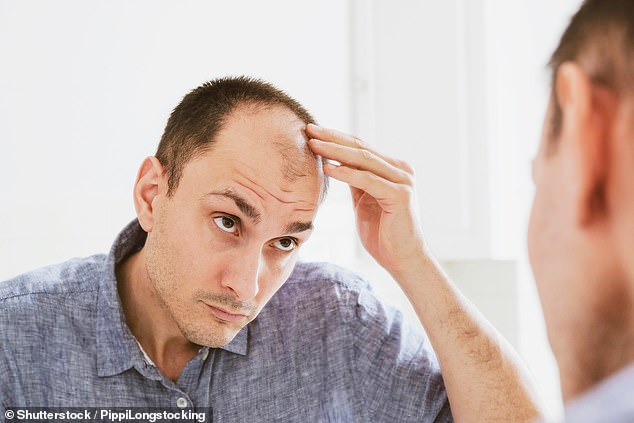British experts have discovered a ‘biological mechanism’ they claim causes thinning hair, and say the discovery could lead to a cure for baldness.
Researchers from the University of Manchester unexpectedly discovered the link in a lab experiment where they were testing a drug to see if it boosted human scalp hair follicles in a dish.
Analysis revealed that when a mechanism called integrated stress response (ISR) was over-activated, it had a negative impact on hair growth.
This response is important as it allows cells to put a brake on regular activities when they are stressed, becoming partially dormant to adapt and deal with the strain.
A follicle cell may become stressed, for example, as it ages and becomes less able to properly produce hair, slowing down growth.


The team, from the University of Manchester, unexpectedly discovered the link in a lab experiment where they were testing a drug to see if it boosted human scalp hair follicles in a dish
If the ISR is overactivated, however, it can cause cells to die — putting a complete stop to healthy hair growth.
As a result, finding a way to stop the overactivation of the ISR may lead to a treatment to prevent hair loss, the team said.
Hair loss affects around 85 per cent of men by the time they reach middle-age, and almost half of women suffer from it by the age of 70, yet there are few treatments.
The Manchester team are now looking to better understand the influence of ISR in hair follicles and study its activity in people with hair loss conditions, hoping to come up with better drug options for those troubled by their thinning thatches.
Dr Talveen Purba, senior author of the study, said: ‘We’re incredibly hopeful as we believe the activation of this pathway could play an important biological role in restricting hair growth in people with hair loss conditions, meaning that targeting it could lead to new treatments.’
Derek Pye, chief technician of the research group and co-author of the study, added: ‘When we look at hair follicles under the microscope, it’s striking how consistent the response is between hair follicles from different people.’
While there are no current drugs known to influence ISR, there are some under investigation in other contexts, Dr Purba said.
And while there are already some medications for hair loss, many people taking them experience side effects and the extent of hair regrowth — if any — can vary from person to person, he added.
The vast majority of men who lose their hair do so because of male pattern baldness, which is a hereditary condition.
Besides medication to encourage hair growth which includes minoxidil, a topical treatment that can be taken by both men and women, and finasteride, some opt for laser treatment to help invigorate circulation in the scalp and stimulate hair follicles, while some go to hair transplant surgery.
The findings were published in the journal Plos One.
Source: Mail Online






